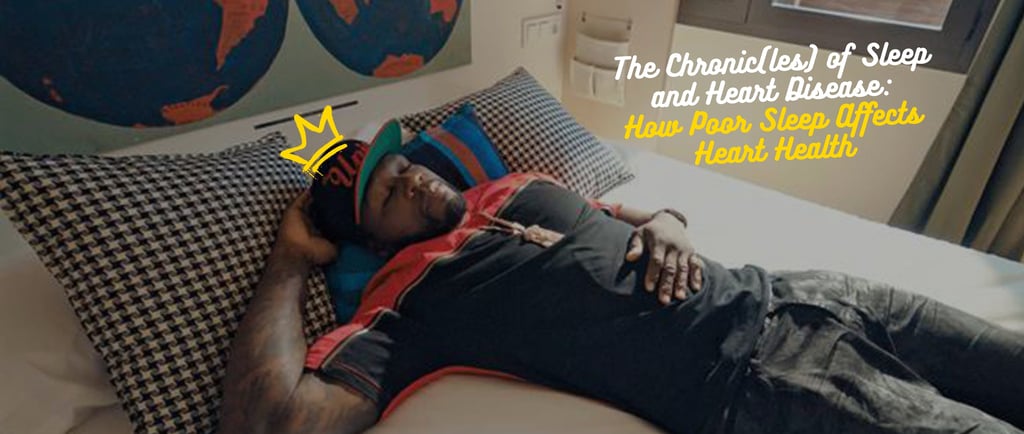The Chronic(les) of Sleep and Heart Disease: How Poor Sleep Affects Heart Health
Sleep isn’t just rest—it’s recovery for your heart. How Poor Sleep Affects Heart Health breaks down the critical connection between sleep and cardiovascular function, especially for performers and nightlife professionals with irregular schedules. Learn how disrupted rest impacts blood pressure, heart rate, and long-term health—and get practical tips to improve your sleep, protect your heart, and boost your performance for the long haul.
SLEEPHEART HEALTH
dj miss kittie
5/14/20253 min read


How Poor Sleep Affects Heart Health
Sleep is more than just rest—it’s a critical period for your body to recover and regulate vital functions, including those that keep your heart healthy. Unfortunately, poor sleep habits, which are common in the nightlife and performance industries, can increase your risk of cardiovascular issues. Understanding the connection between sleep and heart health is the first step to protecting your well-being.
The Heart-Sleep Connection
Your heart works tirelessly to pump blood, deliver oxygen, and maintain overall bodily function. Sleep plays a key role in supporting these processes by:
Lowering blood pressure during rest.
Reducing heart rate for cardiac recovery.
Regulating stress hormones that impact heart function.
Supporting cellular repair and immune function.
When sleep is disrupted or insufficient, these mechanisms can break down, leading to both short- and long-term consequences.
Consequences of Poor Sleep on Heart Health
1. Increased Blood Pressure
Poor sleep, especially less than six hours per night, has been linked to elevated blood pressure.
Without adequate sleep, your body remains in a state of heightened alertness, causing stress hormones like cortisol to stay elevated, which keeps your blood vessels constricted.
2. Elevated Risk of Heart Disease
Chronic sleep deprivation is associated with a higher risk of coronary artery disease (CAD), a condition where the arteries that supply blood to the heart become narrowed or blocked.
Sleep disturbances can contribute to plaque buildup and inflammation in blood vessels, further increasing risk.
3. Irregular Heart Rhythms (Arrhythmias)
Poor sleep quality can lead to arrhythmias, or irregular heartbeats, which can strain the heart and potentially lead to complications like stroke or heart failure.
4. Weakened Heart Muscle
Long-term sleep deprivation can lead to cardiomyopathy, a condition where the heart muscle becomes weakened and less effective at pumping blood.
5. Increased Risk of Stroke
Sleep deprivation and disorders like sleep apnea significantly increase the likelihood of stroke due to disruptions in oxygen levels and blood flow.
Risk Factors Amplified by Poor Sleep
Certain lifestyle factors that often accompany poor sleep can further exacerbate heart health risks:
Smoking and drinking, both of which are common in nightlife, compound the negative effects of poor sleep.
Stress, particularly from irregular schedules or performance pressures, can amplify cardiovascular strain.
Unhealthy diet choices, such as late-night fast food, can lead to weight gain and increased cholesterol levels, stressing the heart further.
How to Protect Your Heart with Better Sleep
1. Prioritize Sleep Duration
Aim for 7-9 hours of quality sleep per night. If your schedule forces late nights, create a consistent sleep window that works for you.
2. Manage Sleep Apnea
If you snore heavily or experience pauses in breathing during sleep, consult a healthcare provider to assess for sleep apnea, a condition strongly linked to heart disease.
3. Adopt a Heart-Healthy Diet
Avoid heavy meals, caffeine, and alcohol close to bedtime.
Focus on heart-healthy foods like leafy greens, nuts, fatty fish, and whole grains.
4. Reduce Stress Levels
Incorporate stress-reducing practices like meditation, deep breathing, or journaling into your routine, particularly before bed.
5. Exercise Regularly
Cardiovascular exercise strengthens your heart and improves sleep quality.
Avoid intense workouts right before bed, as they may make it harder to fall asleep.
6. Optimize Your Sleep Environment
Use blackout curtains, white noise machines, or a comfortable mattress to create a restful sleeping space.
7. Track Your Sleep
Use wearables like a fitness tracker or apps to monitor sleep patterns and ensure you’re meeting your goals.
Small Changes, Big Impact
While the nightlife industry often makes it challenging to prioritize sleep, even small adjustments can have a significant impact on your heart health. By understanding the risks of poor sleep and adopting strategies to protect your rest, you’re not only investing in your long-term health but also improving your performance and energy levels. Your heart works hard for you—make sure you’re giving it the recovery time it needs.
